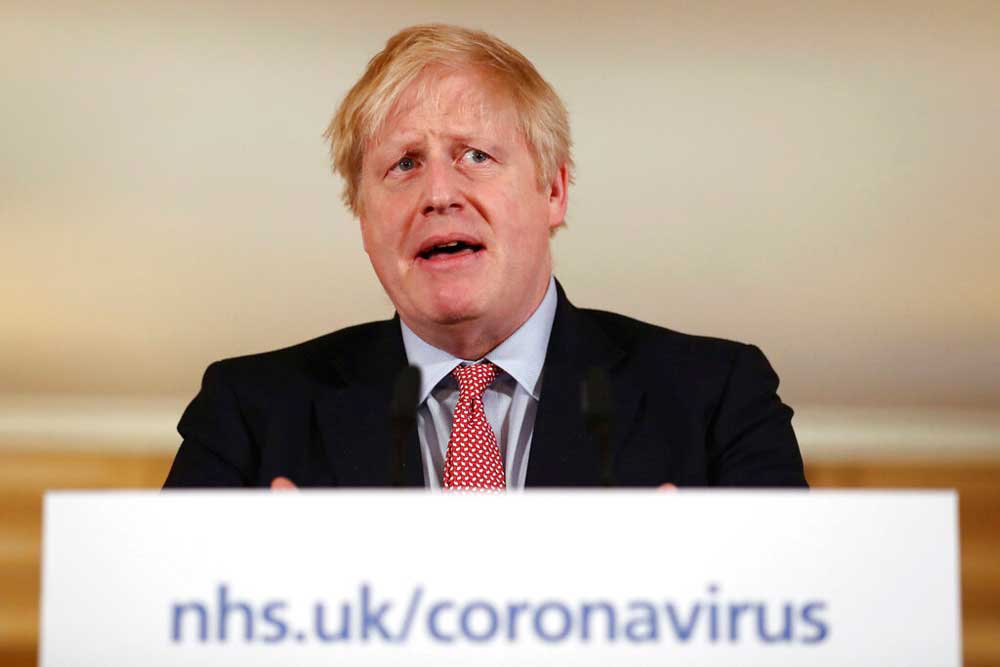There was no sugar coating of the message. “I must level with the British public. Many more families are going to lose loved ones before their time,” Prime Minister Boris Johnson said about the impact of Covid-19.
Johnson’s government’s also refusing to take drastic measures like ones enforced in other parts of the world to stamp out the global pandemic that has spread like wildfire in the last month.
Britain’s laissez-faire approach to tackling the disease is in sharp contrast to the neighbouring Irish Republic, where Taioseach Leo Varadkar’s ordered the closing of schools and colleges. Spain, meanwhile, has declared a state of emergency while Belgium has also shut all educational institutions and restaurants and cafes.
Britain is steadfastly refusing to shut educational institutions and is attempting to carry on normal life to as great an extent as possible, though Johnson said this is being constantly monitored and the position might change if needed.
Patrick Vallance, the government’s chief scientific advisor, has said Britain is hoping that refusing to impose bans will encourage a “herd immunity” so that if enough people contract the virus, the virus won’t be able to infect new people and the virus threat will disappear.
Critics of this approach call it “Darwinian” and scientifically doubtful in the context of Covid-19. But that would require at least 60 per cent and as much as 95 per cent of the UK population to catch the virus and gain immunity from future outbreaks. Vallance has warned that the UK is about four weeks behind Italy which is the epicentre of the European outbreak.
The British approach of “keep calm and carry on” and resistance to taking social distancing measures and other quarantine measures highlight growing differences between the Johnson government and other countries on how to tackle the pandemic.
In Canada, Prime Minister Justin Trudeau announced that he will be “self-isolating” for two weeks and working from home after his wife, Sophie Gregoire Trudeau, tested positive for Covid-19 following her return from a UK speaking engagement. There she was seen hugging singer Leona Lewis and was photographed alongside a variety of celebrities including F1 driver Lewis Hamilton and actor Idris Elba.
In contrast, Johnson is refusing to isolate himself even though his health minister tested positive. He insists he never came within the stipulated one-metre distance of health minister Nadine Dorries who’s now in isolation.
In the US, President Donald Trump has kept up a determined façade of nonchalance even as Australian home affairs minister Peter Dutton was reported Covid-19 positive a few days after he returned from the US where he met Ivanka Trump and justice secretary Peter Barr.
Britain though stands out globally from other countries taking radical moves to combat the virus. Nations like China and South Korea appear to have brought down fresh infection levels thanks to tough measures that include practically closing down whole cities and provinces.
Italy has shut down almost the entire country and ordered the shutting off all retail outfits except pharmacies and food stores, but it is still struggling badly.
However, other organisations in Britain are taking drastic costly steps to curtail the virus’s spread. Britain’s Premier League and English Football League announced they will be stopping all matches till April 3 after Arsenal football club’s manager Mikel Arteta and Chelsea’s Callum Hudson-Odoi tested positive for Covid-19.
The shutdown could take many smaller football clubs to the edge as they don’t have the lavish finances of the top-flight Premier League giants.
Britain now has 708 cases and the count rose by 13 on Thursday. The cases are spread out across the British Isles with 60 in Scotland and 20 in Northern Ireland. So far, 10 people are reported to have died following Covid-19 infections.
This compares to 3,000 cases in Germany and five deaths and 2,876 cases and 61 deaths in France. In Germany, Chancellor Angela Merkel has said that the government was, “playing for time”.
Even though the UK government has said that all educational institutions will stay open, several universities are making their own arrangements to move to distance learning. Durham, Northumbria and Lancaster universities are stopping classes from Monday and are working out other ways to carry on.
Johnson also admits the government is playing for time and insists that, “We have a clear plan that we are now working through.” He’s getting most of his advice from Chris Whitty, England’s chief medical officer, and others like Vallance.
The government has been lambasted strongly for its laidback approach to handling the disease and critics include the former health secretary Jeremy Hunt, who stood for the leadership of the Conservative Party against Johnson.
The Prime Minister insists that, “We are now getting to the next phase. We are trying to contain this disease and thereby minimise its spread and suffering.”
Vallance argues that a softer approach to controlling the disease will be more effective in the long run. “If you suppress something very, very hard, when you release those measures it bounces back and it bounces back at the wrong time,” he argued. He believes if the illness is firmly suppressed now it might return next winter.
Britain’s approach conforms roughly with the World Health Organization (WHO) which has advised against drastic shutdowns to tackle Covid-19. WHO’s director-general Tedros Adhanom said on Friday: “All countries must strike a fine balance between protecting health, preventing economic and social disruption, and respecting human rights.”
One British journalist commented that the Prime Minister “sticks with his highly respected experts”. He added that this was a huge risk, “a huge call that will define his premiership.”










